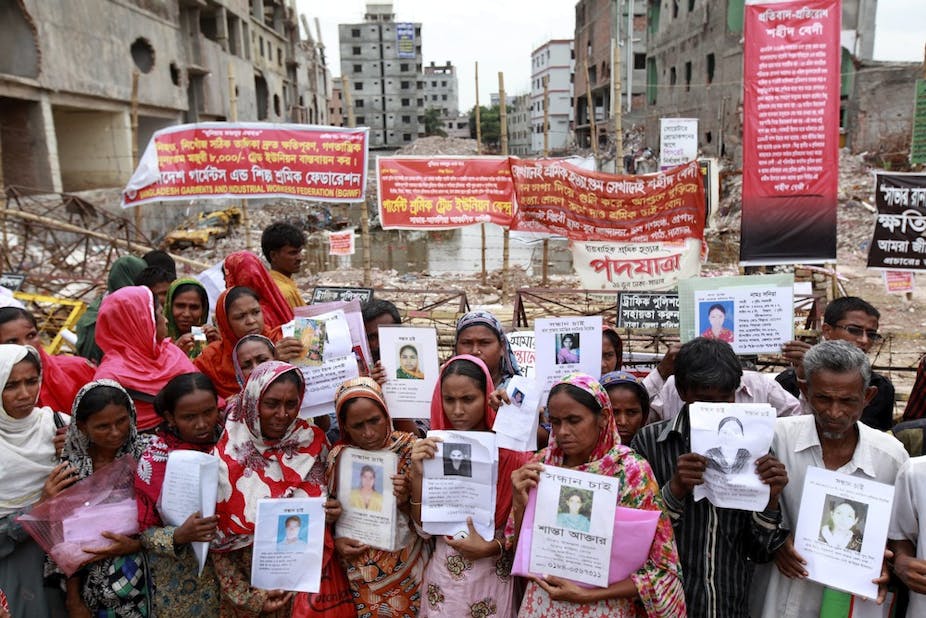Australian fashion brands are under scrutiny once again for labour rights abuses in their supply chain. The recent report for ABC Four Corners exposed the shocking reality for Bangladesh women workers sewing the clothes many of us wear: unsafe buildings; forced labour; punishing schedules; poor wages. While reports of sweatshop conditions are a constant feature of the fashion industry, the recent focus on Bangladesh highlights the human consequences for how corporations source their garments.
The push by European and US brands to source from Bangladesh, closely followed by Australian brands, is driven by cheap labour costs. Bangladesh suppliers for Coles and others featured in the ABC report stated they were paid too little to meet basic safety standards. At the same time, the brands impose very tight timelines on their orders, creating a fast and furious fashion cycle, which is harsh on the workers, and as the Rana plaza collapse demonstrates, may result in deadly consequences.
One of the most confronting revelations of the report was hearing women speak about being forced back to work, despite the unsafe Rana Plaza building having been previously evacuated. The owner of Rana plaza with assistance from the police used threats of violence to force women to go back into a condemned building. The withholding of wages and the fear of losing their jobs was more terrifying than the risk of re-entering the building for these women. There was no one to provide advice or to represent them, as the garment union had not been allowed to. Could things have been different if there was a union acting for them?
The right to union representation is one of the four fundamental principles and rights at work recognised by the International Labour Organisation, standards Australian companies must comply with. Unions provide information, advocacy and a sense of belonging to a collective. They not only speak for workers, but also frequently help workers find their own voices through education and the social support available through the collective. Research shows that unions are instrumental in improving safety standards and increasing wages. The presence of unions has been linked to social and economic development and explains why union representation is an important feature of the decent work agenda.
Business often suggests that there is no place for unions, proposing instead that the markets can regulate themselves. Thinkers like Harvard University Professor Michael Sandel challenge this assertion and propose instead that there are “moral limits of markets”.
While there is limited power for individuals who have few resources within markets, collectives may provide the necessary countervailing power to challenge stronger market forces such as corporations. According to Oxfam, consumers would be willing to pay more to make sure workers receive decent work conditions. Consumers may be seen as complicit in labour rights violations by buying cheap clothing, but importantly brands work hard through their marketing to shape such consumer habits.
Australian brands such as Rivers, Cotton on, Big W and Wesfarmers-owned Coles and Kmart have not given any assurance that their suppliers receive decent prices which could afford them to have safer buildings and pay workers decent wages, although Coles and K Mart have indicated that they will leave Bangladesh. Morally, Australian brands should stay and make sure they create decent jobs not just a job at any price. Cutting and running appears to be a typical response of brands distancing themselves from bad publicity. There is little evidence that workers have benefited much from the fashion industry move into Bangladesh other than having a job. Of course for many of these women a job can make a big difference to their lives.
Campaigns to improve workers conditions and hold corporations to account for workers conditions in Australia and overseas are up against the lack of transparency of a highly mobile industry. Wesfarmers, Woolworths, Rivers and others need to consider the consequence of seeking out the bargain bin suppliers in Bangladesh. The actions of these businesses, while morally indefensible, are legal in the current regulation-free terrain. The Australian government has a responsibility to step up and regulate business around human rights abuses.
The lack of regulation and accountability speaks to the ongoing abuses of garment workers with no end in sight. The tragedy of loss of lives in Bangladesh pricks western consumer conscious for a few weeks then its back to finding the next bargain.
There is no easy answer, but clearly women workers need to raise their voices, represent themselves, to negotiate and improve their lot, and the best way for them to achieve this is through a union. In developing economies, unions can help workers to improve safety and working conditions by fighting for and bringing about the minimum standards of decent work. There is clearly a role for unions in Bangladesh to build capacity for workers to participate in the workplace and improve their work conditions. This could be the best strategy workers take have to strengthen their collective voice towards Australian and global brands.

